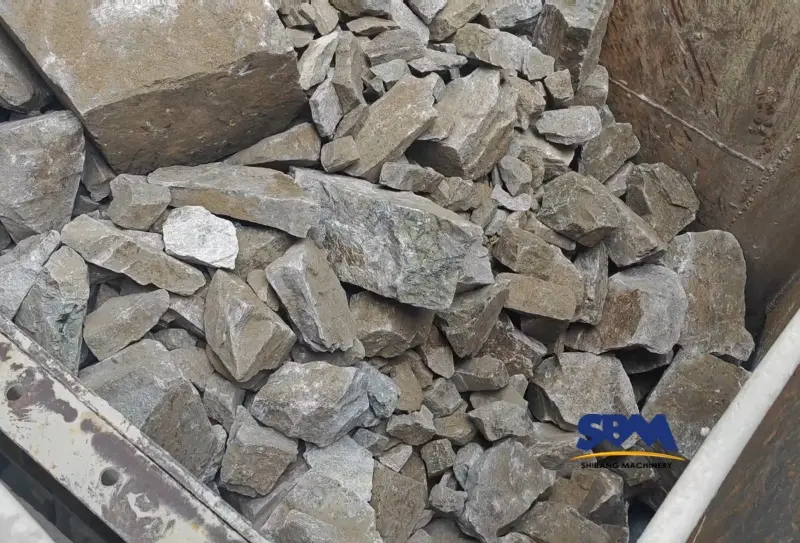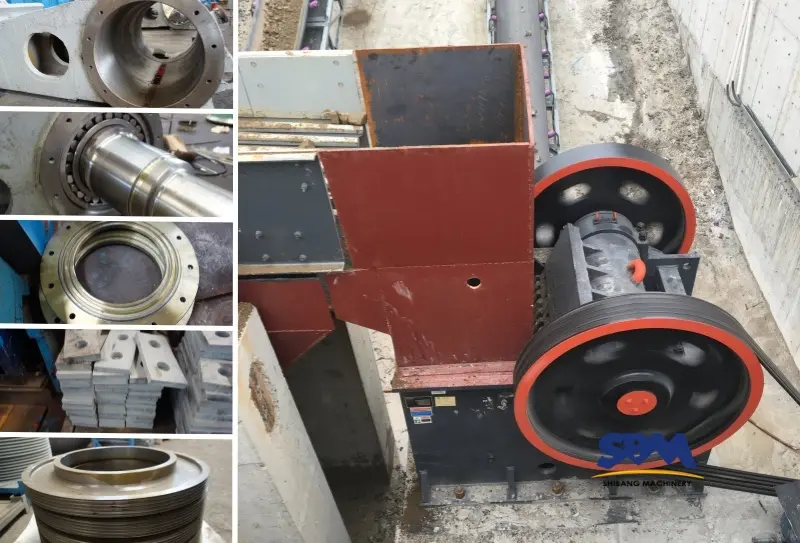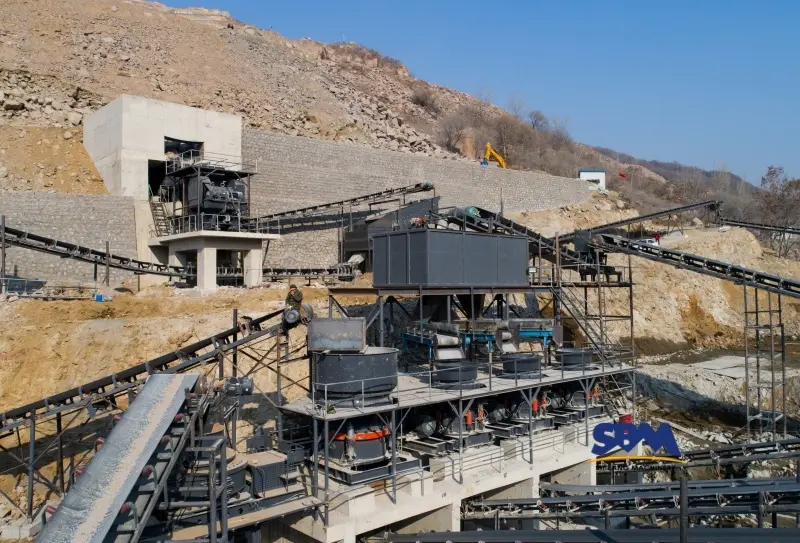Email: [email protected]
5 Mobile Stone Crusher Plant And Application
The term “mobile stone crusher plant,” often referred to as “portable stone crusher plant,” refers to a versatile and conveniently transportable crushing facility that comprises of numerous tools and machinery for breaking down rocks and stones into different sizes of aggregate. It may be relocated from one place to another, enabling on-site crushing operations in quarries, construction sites, and other locations where stone crushing is required.
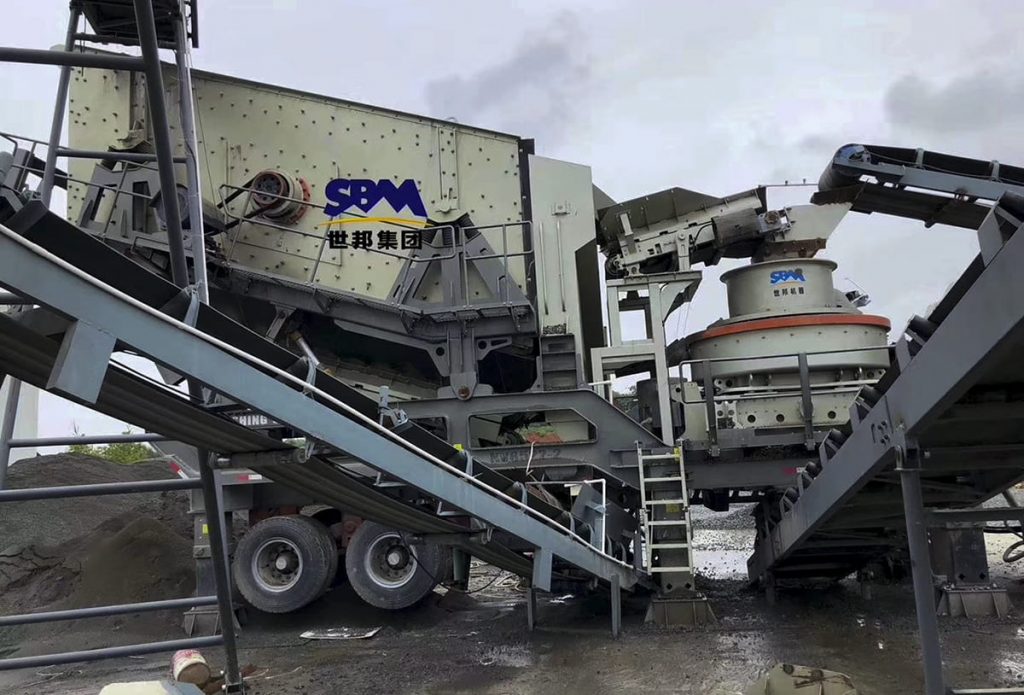
The mobile stone crushing plant generally consists of vibrating screens to separate the broken materials into various sizes, secondary crushing equipment like a cone crusher or vertical shaft impact crusher, and primary crushing equipment like a jaw crusher or impact crusher. A vibrating feeder, conveyor belts, and a control panel for operating the crushing process are possible extra features.
Types of Mobile Stone Crusher Plant
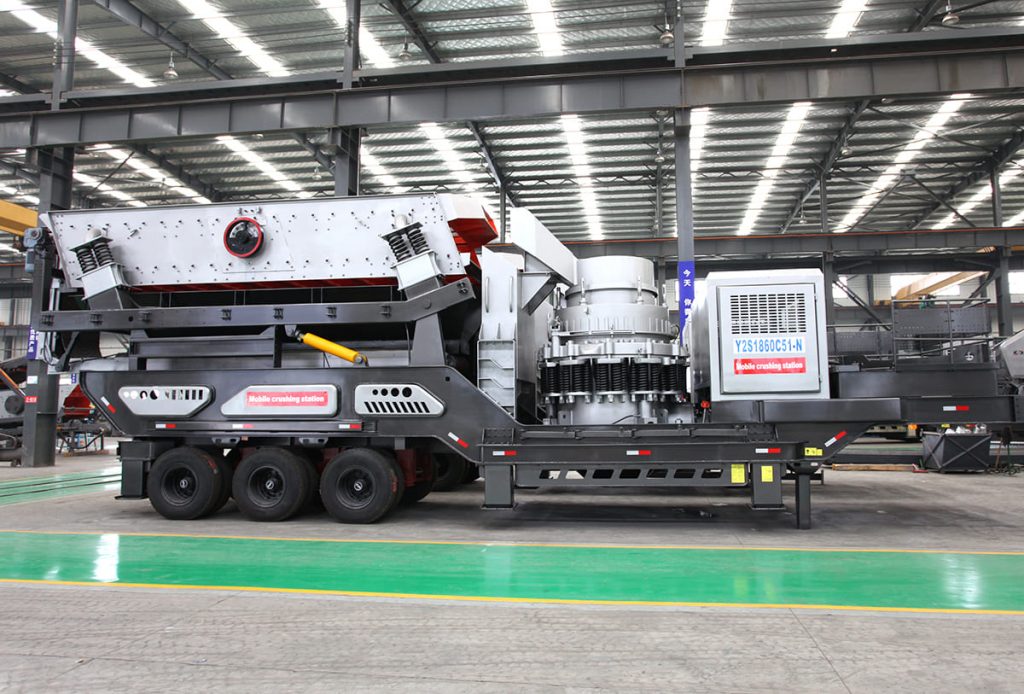
- Mobile Jaw Crusher Plant: The primary crushing machine in this kind of mobile plant is a jaw crusher. It is perfect for handling abrasive and hard materials like granite, basalt, and recycled concrete. Construction waste recycling, mining, and quarrying all often employ mobile jaw crusher machines.
- Mobile Cone Crusher Plant: Applications requiring secondary or tertiary crushing are catered for by mobile cone crusher units. They can smash a variety of stones and ores and have a cone crusher as their primary crushing machine. These facilities are frequently employed in the mining, road building, and aggregate producing sectors.
- Mobile Impact Crusher Plant: Rocks may be crushed and recycled with great adaptability using mobile impact crusher equipment. They may create a variety of final products and feature an impact crusher as the primary or secondary crushing machine. These plants are often employed in mining, recycling, and building demolition.
- Mobile VSI Crusher Plant: High-quality manufactured sand and cubical-shaped aggregates are produced in VSI (Vertical Shaft Impact) crusher facilities. Their primary crushing machine is a vertical shaft impact crusher, allowing them to precisely regulate the final product form. These facilities are frequently used to make synthetic sand, concrete aggregates, and asphalt mixture.
- Mobile Screening Plant: Mobile screening plants are typically used in combination with mobile stone crusher plants, even though they aren’t technically crusher plants. They are made to sort and categorize the crushed materials according to sizes. For accurate and effective screening of diverse types of stones and minerals, mobile screening plants are crucial.
Applications of Mobile Stone Crusher Plant
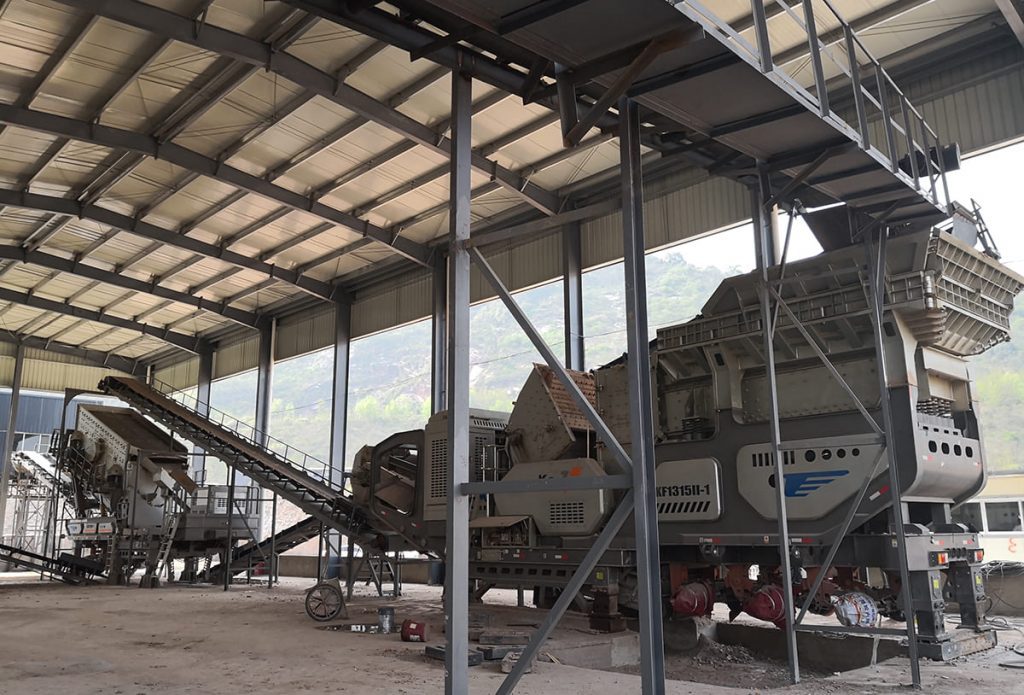
- Construction Projects: Mobile stone crushing units are frequently used in building projects for crushing and processing various building materials, such as aggregates, gravel, and concrete. They are used to crush materials locally, reducing the need for transportation and maximizing resource use.
- Road and Highway Construction: Mobile stone crusher units are used in road and highway construction projects to crush and process stones for the construction of roads, highways, and pavements. They may produce high-quality aggregates in a variety of sizes that are used as the base and surface materials for roadways.
- Quarrying and Mining Operations: Mobile stone crusher machines are widely used to crush and process rocks and minerals in quarrying and mining activities. They are used to instantly crush a wide variety of stones, such as basalt, granite, and limestone. Mobile units offer effective and customizable crushing operations at remote or temporary quarrying and mining sites.
- Demolition and Recycling: Mobile stone crushing equipment is a need for jobs involving demolition and recycling. They may smash and remediate ruined materials like concrete, bricks, and asphalt to produce reusable aggregates or fill materials. By offering on-site recycling, mobile plants reduce waste creation and the need for transportation.
- Aggregate Production: Mobile stone crushing plants create aggregates of different sizes for usage in a range of applications. Raw materials can be processed by mobile plants into appropriate aggregate sizes for use in making concrete, constructing roads, or making railroad ballast.
- Landscaping and Gardening: Mobile stone crusher devices can be used when crushed stones are needed for landscaping and gardening operations. They work with stones that are used to pathways, garden borders, decorative accents, and other landscaping projects.
- Remote and Inaccessible Areas: Mobile stone crusher units are useful in remote or hard-to-reach areas where access to stationary crushing machines may be challenging. Due to how easily they may be moved there, these areas can support on-site crushing operations, which reduces the need for material transportation.
- Industrial Applications: Mobile stone crushing devices are utilized in a variety of industrial sectors whenever it is essential to smash stone. Businesses in the cement, power, steel, and chemical sectors, among others, may employ mobile stone crusher plants to process raw materials or produce specific aggregates for their operations.
How does a mobile stone crusher plant work?
- Feeding: The raw materials are fed into the mobile stone crushing plant either by a vibrating feeder or a loading device. The raw materials—such as rocks, stones, or recycled concrete—are fed into the main crusher gradually and uniformly.
- Primary Crushing: The bigger rocks or stones are reduced in size by the first crusher, which is frequently a jaw crusher or an impact crusher. The material is compressed by the crusher, which also reduces its size and gets it ready for processing.
- Secondary Crushing: The material may occasionally go through secondary crushing, depending on the desired ultimate product size. Usually, a cone crusher or an impact crusher is used at this stage. The secondary crusher further decreases the material’s size till it meets the required standards.
- Screening: The crushed material is transported to a mobile screening facility after being crushed in various stages. According to the parameters for the intended final product, the screening plant divides the crushed material into various sizes or classes. This makes it easier to make sure the finished product satisfies the necessary dimensions and quality requirements.
- Conveyor System: Conveyors are essential to the process because they move the crushed material between the various phases. They make it easier for material to be moved between the feeding unit and the crushers as well as between the crushers and the screening unit.
- Final Product: The final product is obtained once the material has been through the screening procedure. Depending on the purpose, the aggregate might be a certain size, such as crushed stone or produced sand, or it can be a mix of different sizes.
- Mobility and Power Source: The mobility of a mobile stone crushing unit is what sets it apart. On-site crushing is possible thanks to the plant’s simple transportation from one place to another. Diesel engines are frequently used in mobile plants to generate power, enabling the plant to function even in locations without access to electricity.
What are the advantages of Mobile Stone Crusher Plant?
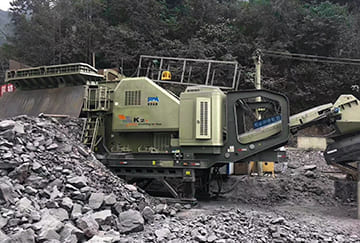
Mobile stone crusher plants offer several advantages over traditional stationary stone crushing plants.
- Flexibility and Mobility: A mobile stone crushing plant’s versatility and mobility are by far its greatest benefits. It may be conveniently moved from one location to another, enabling on-site crushing operations at several sites. This reduces the need for numerous material transportations, saving money and time.
- Cost-Effectiveness: Stone crushing mobile facilities are frequently more economical than permanent units. They take the place of time- and money-consuming, substantial groundwork, foundation building, and installation. For some projects, mobile plants can also be leased or hired, which lowers the initial capital expenditure.
- Quick Setup and Dismantling: Mobile stone crushing units may be swiftly assembled and disassembled, enabling speedy deployment to various project locations. When frequent site changes are necessary or when projects are ephemeral, this is very advantageous. Increased operational efficiency is the consequence of quick setup and breakdown periods.
- Efficient Crushing Process: Modern crushing technology that offers excellent efficiency throughout the crushing process is included in mobile stone crusher plants. They frequently have potent cone, impact, or jaw crushers that can rapidly and effectively smash a variety of rocks or stones.
- Versatility in Applications: Mobile stone crushing units are adaptable and useful in a variety of settings. They work well for crushing a variety of pebbles and stones, including tough and abrasive ones. They are therefore perfect for applications including mining, quarrying, road building, and recycling.
- Reduced Environmental Impact: The environmental effect of stone crushing operations may be lessened with the use of mobile stone crusher units. They can have cutting-edge dust suppression systems installed to reduce dust emissions. Additionally, by crushing materials locally, less transportation is required, resulting in a reduction in carbon emissions.
- Enhanced Productivity: Productivity is boosted by the portability and flexibility of mobile stone crushing facilities. Materials may be treated instantly with on-site crushing capability, negating the requirement for transfer to a stationary facility. Project completion times are accelerated, and total productivity is raised.
- Accessibility to Remote Areas: In places where access to fixed plants may be difficult or impossible, mobile stone crushing units are very helpful. They may be readily moved to these places, making it possible to conduct effective crushing operations even at far-off project sites.
What are the common faults and solutions of Mobile Stone Crusher Plant?
Crusher Jamming
- Fault: The crusher becomes jammed due to oversize or sticky material.
- Solution: Immediately halt the feeding procedure and remove all of the material from the crusher cavity. Before the material enters the crusher, remove the oversize material by adjusting the feeding size or using a grizzly screen.
Conveyor Belt Issues
- Fault: Conveyor belt slipping or misalignment, causing material spillage or uneven feeding.
- Solution: Verify the conveyor belt’s tension and alignment. If required, adjust the belt or get a new one. Make that the belt is being tracked correctly, and inspect the conveyor system for any damage or obstructions.
Blockages in the Screening Unit
- Fault: Material gets stuck or clogged in the screening unit, reducing efficiency.
- Solution: Stop the screening procedure and manually clear any obstructions. To avoid accumulation, examine and clean the screening unit often. To increase material flow, if necessary, modify the screening settings.
Insufficient Crushing Capacity
- Fault: The mobile stone crusher plant is unable to process the desired amount of material within a given time.
- Solution: To optimize the crushing process, check the crusher settings and make any adjustments. Make sure the material is fed properly, and if necessary, modify the rate of feeding. If the demand exceeds the capacity, think about upgrading to a larger crusher.
Power Failure or Electrical Issues
- Fault: Power outage or electrical malfunctions that halt the operation of the plant.
- Solution: Verify the connections and power supply. Any electrical problems, such as blown fuses or tripped circuit breakers, should be addressed right away. For continuous operation, think about having backup power sources or generators on hand.
Excessive Wear of Crusher Parts
- Fault: Premature wear of crusher components, such as jaw plates, blow bars, or liners.
- Solution: For continued peak performance, examine and replace worn-out components often. Observe the recommended maintenance and replacement intervals from the manufacturer. For extended lifespan, choose high-quality, suitable wear parts.
Vibrations or Excessive Noise
- Fault: Excessive vibrations or noise during operation, indicating potential mechanical issues.
- Solution: Check the device for loose or broken parts. Lock down any slack nuts and bolts. According to the manufacturer’s instructions, lubricate moving components. Consult a specialist or the manufacturer for a more thorough check if the vibrations continue.
Control System Malfunctions
- Fault: Malfunctions in the control system, leading to erratic operation or failure to respond to commands.
- Solution: Check the control system for any broken or loose connections. If feasible, restart the computer or reset it. If the problem continues, get help from a certified technician or the equipment’s manufacturer.
Headquaters Office
Whatsapp:+8615225176731
Email: [email protected]
Address: No. 1688, Gaoke East Road, Pudong new district, Shanghai, China.
Website: https://www.mill-sbm.com/
Headquaters Office
Whatsapp:+8615225176731
Email: [email protected]
Address: No. 1688, Gaoke East Road, Pudong new district, Shanghai, China.
Website: https://www.mill-sbm.com/
Article Contents
Recent Posts
- Jaw Crusher Feeding Tips: 5 Strategies to Eliminate BlockagesBlocked crushing chambers are a universal headache in aggregate processing. From quarries in Sweden to recycling plants in Texas, improper feeding tips and methods can cripple jaw crusher efficiency. Let’s…
- Jaw Crushers Spare Parts Guide | Replacement Components & Maintenance TipsCritical spare parts for jaw crushers are vital as they keep these machines running efficiently. This guide dives into the jaw crusher spare parts list, offering actionable insights for maintenance,…
- Crushers in Aggregate Production: Key Equipment and Best PracticesModern construction relies on efficiently processed aggregates, making crushers indispensable in mining and quarrying operations (aggregate production). This guide examines international applications of crushing technology, equipment selection strategies, and maintenance…

